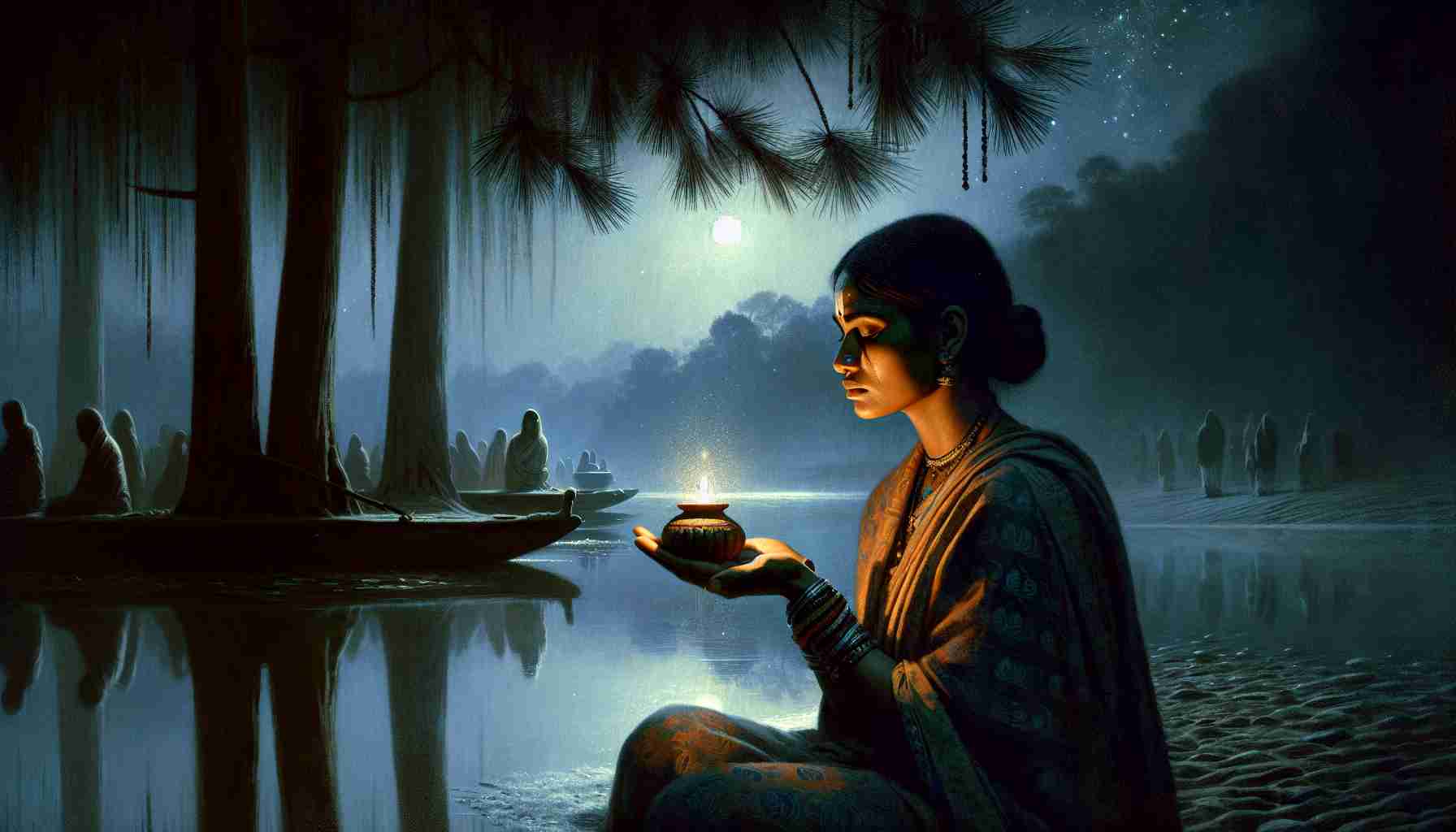

I am Kavita, daughter of Mukund and Sita, born in the foothills of Himachal where the pine trees meet the sky. I live alone now, though once my house sang with laughter. It’s strange how silence can feel heavier than the loudest noise.
My son, Aarav, was eight when a fever took him. One day he was skipping stones by the Ganga—our sacred river—and the next, I was lighting a diya—a small clay lamp—not in prayer for his future, but in mourning for a life that slipped from my arms.
I stopped going to the temple. I stopped singing bhajans—devotional songs that once lit my mornings like sunlight. Days turned into nights, seasons passed, but grief stayed, curled in the corners of my home like smoke that wouldn’t rise.
Then one evening, nearly a year later, I walked to the river again. I don’t know why. Maybe my feet remembered what my heart had forgotten.
I brought a diya with me. I sat by the Ganga, like Aarav used to, and let the silence throb.
I lit the lamp. My hands shook. In that tiny flicker, I saw his face. I whispered, “Where are you, beta?”
A leaf floated past. The current moved softly, wrapping around the diya like it was guiding it. In that moment, I remembered a verse from the Bhagavad Gita, Chapter 2, Verse 20: “The soul is neither born, and nor dies… it is eternal, ever-existing, and primeval.”
I had heard that verse many times, but sitting beside the river with grief unguarded, it felt personal. Not a lesson, but a whisper.
I began to weep—not like I had at the funeral, but deep, slow sobs, as if the sorrow that had turned into stone was cracking open.
That’s when I felt it. I can’t explain it fully—it wasn’t a voice or a vision. Just a soft certainty, like when dawn touches dark sky. A feeling that I was not alone. That in breaking, my heart had become porous enough for something Divine to enter.
The Upanishads teach that the Atman—the soul—is a spark of Brahman, the ultimate reality. That day by the river, I didn’t just read those words. I lived them. Aarav’s body may have been taken by fever, but his essence wasn’t lost. He was and always would be part of the Divine thread that binds everything.
I still miss him. Every day. But I sing again now. Some mornings, I hum the Gayatri Mantra like I used to when he’d sit on my lap.
The Mahabharata says that even Yudhishthira, the eldest Pandava, had to walk through grief to understand dharma—cosmic order. I believe now that grief isn’t a punishment.
It’s a doorway.
And sometimes, when you think the heart has shattered beyond repair, it has only opened wide enough for God to step in.
I am Kavita, daughter of Mukund and Sita, born in the foothills of Himachal where the pine trees meet the sky. I live alone now, though once my house sang with laughter. It’s strange how silence can feel heavier than the loudest noise.
My son, Aarav, was eight when a fever took him. One day he was skipping stones by the Ganga—our sacred river—and the next, I was lighting a diya—a small clay lamp—not in prayer for his future, but in mourning for a life that slipped from my arms.
I stopped going to the temple. I stopped singing bhajans—devotional songs that once lit my mornings like sunlight. Days turned into nights, seasons passed, but grief stayed, curled in the corners of my home like smoke that wouldn’t rise.
Then one evening, nearly a year later, I walked to the river again. I don’t know why. Maybe my feet remembered what my heart had forgotten.
I brought a diya with me. I sat by the Ganga, like Aarav used to, and let the silence throb.
I lit the lamp. My hands shook. In that tiny flicker, I saw his face. I whispered, “Where are you, beta?”
A leaf floated past. The current moved softly, wrapping around the diya like it was guiding it. In that moment, I remembered a verse from the Bhagavad Gita, Chapter 2, Verse 20: “The soul is neither born, and nor dies… it is eternal, ever-existing, and primeval.”
I had heard that verse many times, but sitting beside the river with grief unguarded, it felt personal. Not a lesson, but a whisper.
I began to weep—not like I had at the funeral, but deep, slow sobs, as if the sorrow that had turned into stone was cracking open.
That’s when I felt it. I can’t explain it fully—it wasn’t a voice or a vision. Just a soft certainty, like when dawn touches dark sky. A feeling that I was not alone. That in breaking, my heart had become porous enough for something Divine to enter.
The Upanishads teach that the Atman—the soul—is a spark of Brahman, the ultimate reality. That day by the river, I didn’t just read those words. I lived them. Aarav’s body may have been taken by fever, but his essence wasn’t lost. He was and always would be part of the Divine thread that binds everything.
I still miss him. Every day. But I sing again now. Some mornings, I hum the Gayatri Mantra like I used to when he’d sit on my lap.
The Mahabharata says that even Yudhishthira, the eldest Pandava, had to walk through grief to understand dharma—cosmic order. I believe now that grief isn’t a punishment.
It’s a doorway.
And sometimes, when you think the heart has shattered beyond repair, it has only opened wide enough for God to step in.